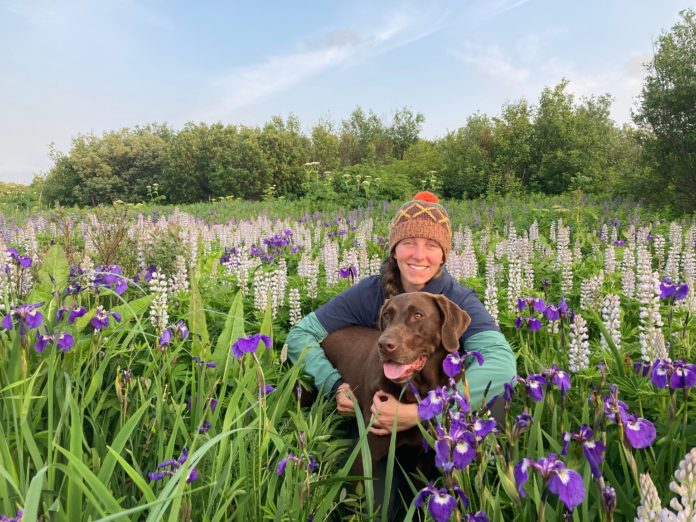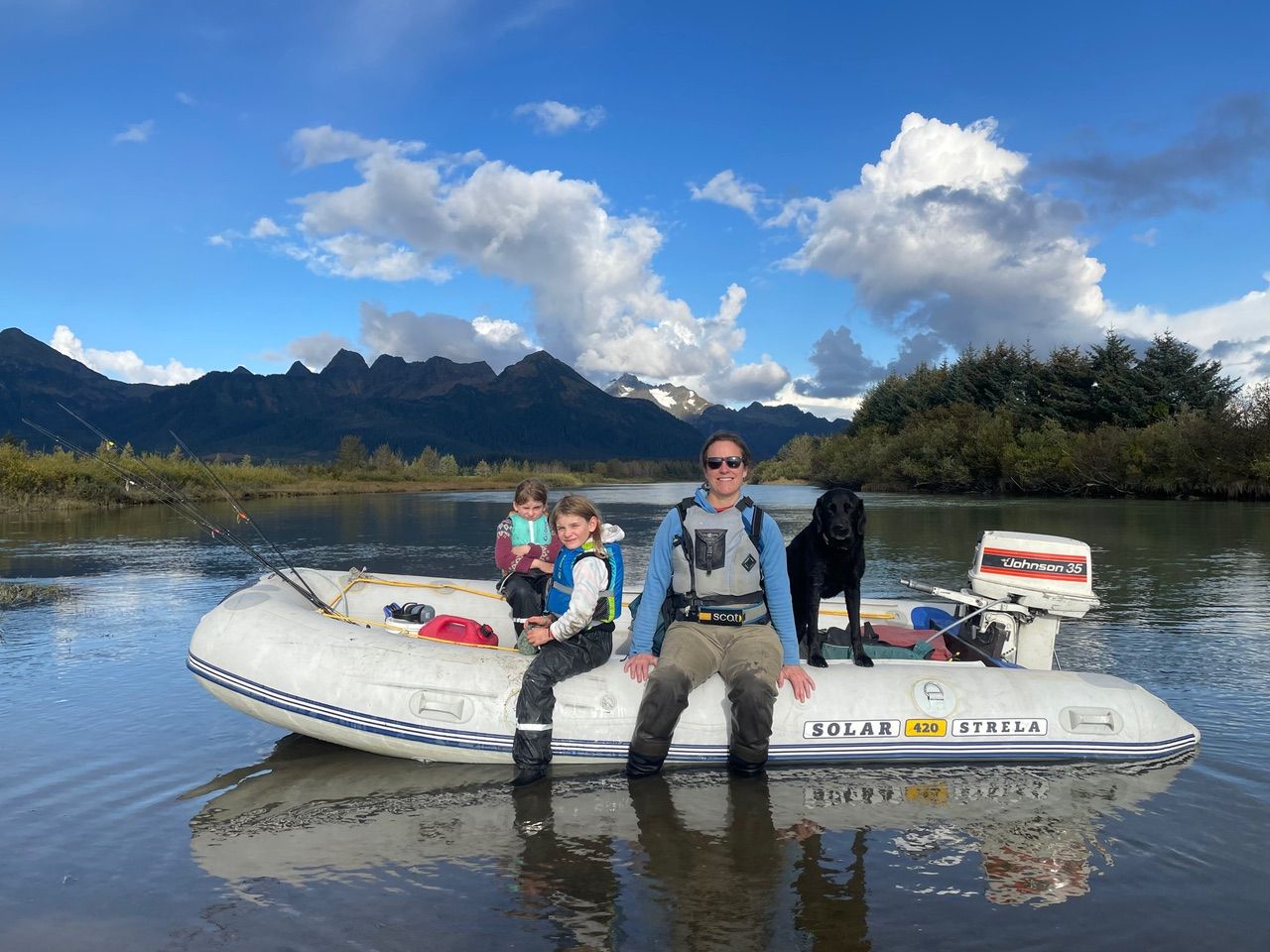
March is Women’s History Month, and this month The Cordova Times is celebrating the remarkable achievements of some of the incredible women who make up the Cordova community. Women in the Cordova community are educators, leaders, civil servants, scientists, historians, storytellers, culture bearers, and pioneers. We’ve profiled a few of the women who keep our community running and progressing, and you can read their answers to our questions below. If you would like to submit a brief summary about a Cordova woman you want to celebrate, you can reach out to grace@thecordovatimes.com.
Lauren Bien
Lauren Bien is the education director at the Prince William Sound Science Center. She moved to Cordova in 2015 to work at the Science Center.
What adversity or challenges have you had to face and overcome as a woman to get to where you are now?
Growing up, we were constantly being told boys were faster, stronger, smarter, and “better at certain things.” A loud boy was a “leader” and a goofy boy was a “class clown,” while a loud girl was “bossy” and a goofy girl was “annoying.” We were expected to make ourselves smaller, to be quiet, to not take up as much space. Luckily, that didn’t sit well with a lot of young girls in my generation, and I think there was a strong sense of sisterhood when we collectively decided not to shy away from who we are, to speak up, and to take up space.
What makes Alaskan women so special?
Alaskan women are fierce supporters of each other and their communities. I’ve lived in six states across the country, and I’ve never met women as strong, involved, and kind as the women in Cordova.
What does womanhood mean to you?
Strength, passion, generosity, wisdom, tenacity, empathy, resolve, bravery, boldness, sisterhood, joy, and so much more. Being a woman is whatever you want it to be.
Who was an influential female mentor you’ve had in your life and how do you hope to mentor the next generation of young women?
My mom! I know that is clichéd, but my mother is a dedicated scientist with a successful career and five patents to her name. She encouraged my curiosity, taught me how to think critically, and inspired me to explore the natural world. As a scientific educator, I aim to do exactly that with all the young women I teach.
What’s one piece of advice you’d give to your younger self or to young women in the region?
Be kind, dance whenever you can, and dream big dreams. You are beautiful in whatever way you choose to show up in this world.
Kate Morse
Kate Morse first came to Cordova 21 years ago when she came to town for an internship with the Prince William Sound Science Center. After the internship concluded she never left, and has now become the program director for the Copper River Watershed Project.
What does it mean to you to be a woman in your field/industry?
I feel like the nonprofit sector has a larger proportion of women in leadership positions, and in general there seems to be a general expectation that the nonprofit sector has lower earning power. So being a woman in the nonprofit sector means to me that my work is a lot more than what I get paid at the end of the day. It means more to me to make on-the-ground impacts for the benefit of the Copper River watershed, a region I am very passionate about, than to maximize my earning power. This is a hard thing to balance in a place like Cordova, where I am raising a family and where the cost of living is so high and continuing to climb – but as a woman, with an innate desire to nurture, care, and build community for the benefit of the world around me, my work provides me that opportunity, in a more flexible structure than a complex, public bureaucratic organization, so I remain committed to my work at the CRWP.
What adversity or challenges have you had to face and overcome as a woman to get to where you are now?
Given there’s not much competition for low-paying jobs, I think the hardest thing I’ve overcome was being a teenager! While boys tend to address their conflict up front, there is a silent culture of bullying among girls, where saying nothing can do more harm than actual words, and the angst over “fitting in” and “meeting expectations” of peers and parents can be overwhelming. And I’m not sure I’ve “overcome” the challenge. There is still pressure to “fit in” and do things a certain way in our culture, but I think I’ve worked to re-prioritize whose opinion matters (mine!) and better recognize when I am losing a sense of myself by trying to be everything to everyone else. There have also definitely been instances where I’ve felt talked down to because I’m a woman and “wouldn’t understand” the complicated points being discussed, but I’m not one that easily gets “talked over” anymore (as the youngest of four kids there was a lot that was talked over my head, or so they thought…). I’ve been working to call a spade a spade. It has taken time and experience to give me the confidence to do so, and I hope I can help other women in their careers find their confidence and voice so they are not shut down by others who doubt their abilities.

What makes Alaskan women so special?
My first reaction was that they are tall and have big feet too! As I’ve lived here for just over 20 years, now, I not only have many amazing shorter friends with smaller feet, but I also appreciate the “go get ‘em” attitude of Alaskan women. If something needs to be fixed there’s not always an easy outlet to call and get help, so Alaskan women will jump right in to figure it out. We don’t need to be sheltered or coddled from discomfort or things that are hard. Alaskan women are active in problem-solving and figuring out solutions, especially when things are hard or uncomfortable. There is also a strong sense of “it takes a community to raise a child.” I feel so fortunate my daughters have so many aunties to love them, teach them, and to help me raise them. I live so far from blood relatives, but am surrounded by so many helping hands and I’m so thankful to have so many positive female role models in my daughters’ lives.
What does womanhood mean to you?
To be a woman. Hear me roar. While I think our culture has typically tied womanhood with sexual maturity, I think being a woman shouldn’t just be tied to sex or reproduction, but I do think it’s tied to maturity. As we emerge from our teenage years we developmentally start to see beyond ourselves at the center of it all and better recognize our role in working toward the greater good of our community. As women tend to be more emotion-driven, I think it also leads to women being more empathetic to those around us. We are more aware and tapped into how others are feeling, and more likely to connect with those not doing well to help lift up the collective whole rather than excel at the expense of others or capitalize on when others are down. This is also consistent with the inherent nature of women to nurture. Whether it is our own children or the community of people around us, I think we are the strongest when everyone is successful vs. strength being the one person who is most successful.
Who was an influential female mentor you’ve had in your life and how do you hope to mentor the next generation of young women?
My high school field hockey coach had a significant impact on my life. While she was a decorated champion herself and coached many championship teams, she was not a loud, in-your-face coach. She was a patient, calm person who maintained a steady presence on the sideline. She never gave anyone a hard time for making a mistake on the field. She only used them as teachable moments to boost young women to not let a mistake beat them twice. And if you made a mistake off the field, she wouldn’t yell or carry on. In fact it felt worse to have her calmly express her disappointment, and it made you vow to make sure the mistake was never repeated. She earned respect, she didn’t demand it. She was also capable of coaching at the highest level she could have dreamed of — college or national level — and was actively recruited to leave behind her small high school team in central Pennsylvania, but she wasn’t interested in climbing the ladder to the “best teams.” She was committed to making her team, wherever it was, the best they could be.
I hope to be a positive, encouraging presence in the lives of the young women I work with. I want to help them see their strengths, positive contributions and be confident in exactly who they are and not focused on what others expect them to be. I want to help them discover what excites them and encourage them to pursue their passions, even if they aren’t “popular choices.” And I want to make sure they have enough confidence to not get knocked down by others who doubt their capabilities or have different expectations for the role of women in our world.
What’s one piece of advice you’d give to your younger self or to young women in the region?
Some advice that has resonated with me in recent history is the idea that life doesn’t get easier, we just get better at the hard. This shifts the mind from thinking about “if I just get through this then it will be easier,” but there’s always going to be hard things to figure out, or difficult people to work with. Focusing on “I’m getting better at hard stuff” brings the strength back to the individual. You can’t control what’s going on around you, but you can prepare yourself and have confidence in yourself to help you through the hard things. Each event and relationship in life teaches us something (or many things) that we can carry into the next event or relationship.














